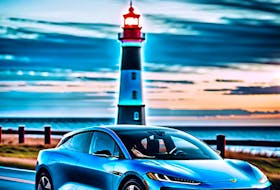A good electric car for Newfoundland and Labrador might seem like an oxymoron: The stereotype of an expensive rinky-dink coupe with a small range that worsens in cold temperatures, set against the backdrop of a vast, largely rural province with bitter winters and the risk of moose collisions.
But Jon Seary is here to dispel the myths surrounding electric vehicles.
“The perception for many people is that electric cars are either little squat tiny things or expensive Teslas,” says Seary, a business technology consultant by day and co-founder of Drive Electric NL by night. “But the cost of electric cars is dropping, and there are new models on the market all the time.”
Atlantic Canada has been relatively slow to adopt electric vehicles, in part due to concerns about the high price tag, lack of charging stations, range anxiety and the loss of battery life in cold weather.
Seary, though, has been driving an electric for four years, and says the performance and cost savings have surpassed his expectations.
He drives a Tesla Model X SUV, and says the $4,000 a year he paid at the gas pump has been replaced by an $800 electricity bill. His wife drives a Nissan Leaf and has seen her $1,500 in fuel-ups fall to about $176.
Although they purchased the vehicles without any subsidies, Seary argues in favour of incentives.
“They don’t need to be in place indefinitely,” he says, adding that once there’s enough momentum the subsidies could be phased out.
Atlantic Canada, electric laggards

Curbing emissions from the gas-guzzling transportation sector – the second largest source of greenhouse gas emissions in Canada – is quickly becoming a priority across the country.
With mounting climate change concerns, governments are responding with subsidies that encourage the adoption of electric vehicles.
A new federal rebate announced last spring offers consumers up to $5,000 back on the purchase of a zero-emission vehicle.
A spokesman for Transport Canada said as of Oct. 13, the federal department had received 25,516 requests for the incentive. But only 128 applications were received from the four Atlantic provinces – about half a per cent, despite the region making up closer to 6.5 per cent of the country’s population.
Meanwhile, Quebec and British Columbia also offer an additional provincial subsidy, as did Ontario before it was scrapped by Premier Doug Ford.
While the four Atlantic provinces don’t currently offer rebates on electric vehicle purchases, many charging stations in the region have been installed using public funds – with some even offering free electricity.
As electric vehicles become more mainstream, with prices expected to reach cost parity with gas cars by around 2025, the question of whether governments should be subsidizing electric vehicles is the subject of debate.
Advocates say subsidies encourage more people to go electric, reducing air pollution and boosting technological innovation. But critics say the subsidies largely benefit people with higher incomes.
Electric still largely for the affluent

For example, a city of Toronto report found that electric vehicle owners were more affluent, with average household incomes of $114,300 compared to $83,100 for owners of internal combustion engine vehicles.
“The people who buy electric vehicles are usually better off,” says Larry Hughes, a Dalhousie University professor and founding fellow of the MacEachen Institute for Public Policy and Governance.
“Then there’s this idea of the free rider.”
He pointed to the issue of road taxes, which are worked into the cost of gasoline and diesel fuel in most provinces.
“If you drive an electric vehicle in Nova Scotia, you pay no road tax,” Hughes says, noting that until the issue is addressed those costs are passed on to others.
Critics also say there are more effective ways to reduce carbon emissions, such as developing renewable energy and electrifying the transit sector.
Germain Belzile with the Montreal Economic Institute, an independent research group, called electric vehicle subsidies “a bad use of taxpayer money.”
“They cost a huge amount of money per tonne of carbon not emitted,” says Belzile, who also teaches economics at HEC Montreal. “You can do much more to help reduce our carbon footprint with a lot less money.”
Coal-powered electric car?

The effectiveness of a subsidy in reducing carbon emissions depends largely on the province’s utility grid – the so-called upstream emissions created by generating the electricity.
In Newfoundland, where a surplus of hydroelectric power will become available once Muskrat Falls comes online, operating an electric vehicle will produce dramatically fewer emissions than a gasoline car.
But Nova Scotia is one of three provinces where going fully electric might not be the best option.
The province’s coal burning power plants make driving a fully electric vehicle actually worse for the environment than driving a hybrid – though both are still better than a gasoline-powered car.
In other words, subsidizing a fully electric Hyundai Ioniq – rather than the hybrid Toyota Prius, for example – is “equivalent to subsidizing an increase in emissions,” Dalhousie researcher Zachary Thorne said in a recent journal article.
“The environmental impacts of EVs vary greatly between provinces and have significant implications” on the cost-effectiveness of subsidies, he said.
But Kevin Boutilier, a clean energy specialist with the Halifax Regional Municipality, points out that electric vehicles are 90 per cent more efficient than an internal combustion engine vehicle.
“The grid might be dirty, buy you’re still using less energy, which results in a lower carbon footprint.”
RELATED:
- Tesla drops cheapest Model X, S variants, cuts prices to simplify lineup
- Porsche's electric Taycan: Flat-out fast with a battery that can handle the horses
- Extinction Rebellion group unhappy with decision not to replace Charlottetown transit buses with electric vehicles
- Nova Scotia needs to decarbonize the electricity grid by 2030, says Elizabeth May









